David Billingsley's Blog, page 2
July 21, 2020
READ!

This is not a particularly nice picture of a bookcase, but it’s just one of many in my house. Certainly the number of books my immediate family has acquired and read since my spouse and I started this household decades ago numbers in the thousands upon thousands. And I’m not the prolific reader in the family. That label goes to my two children and my spouse.
In my youth, I read some, but not a lot. Yet all of my close friends (I hung around the geeky smart crowd) were heavy readers of all things fiction. Let’s just say it was an early lesson in simple correlation – smart, good kids were also into reading for pleasure and entertainment. A lot.
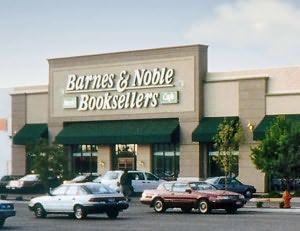
So when my spouse and I delved into the frightening world of parenthood, we decided (1) we would read constantly to our children when they were very young, and (2) buy them all the books they desired when they could read for themselves.

In their youth, a weekend trip to Barnes and Noble or Borders cost me at least 100 bucks each time. We’d walk away with a stack of new books. Later, and more economically, it was Half Price Books and other used bookstores where the stack might be twice as high. In fact, my daughter worked at a used book store in college. Then comes Amazon and its roughly 33 million titles. Kindles, iPads, Nook, etc.

In the early days of parenting, I didn’t know I was doing the right thing. Just guessed I was. Now, one can find all kinds of evidence that reading for pleasure leads to good personal and social outcomes for kids beyond reading comprehension. There is some evidence that prolific readers are more relaxed (at least while reading, read less stress!), have an enhanced sense of creativity and imagination, greater emotional intelligence, better communication skills, more empathy, greater understanding of other cultural and social environments, and on and on.

Simply from reading for pleasure, you say? If you don’t believe it, research it for yourself. Conversely, it is quite difficult to find examples of overall negative aspects of reading.
Which brings me to a slight fear of mine. Reading is still a very popular pastime, yet our children (and the rest of us) are constantly bombarded with activities that are far less positively stimulating, and WE are the examples. What does binge-watching of the umpteen thousand shows on TV these days do to us? What kind of example are we? In fact, its even hard to read w/o disconnecting from the online world. We are all too busy looking at stupid memes, writing ugly comments on social media, scanning (not really reading) what is called news on our phones, writing blogs :), etc.
Best gift you could ever give to your children – the enjoyment of reading! Or in my case, they gave the gift to me…
Circling the Sun (Review)
[image error]
A superb read!
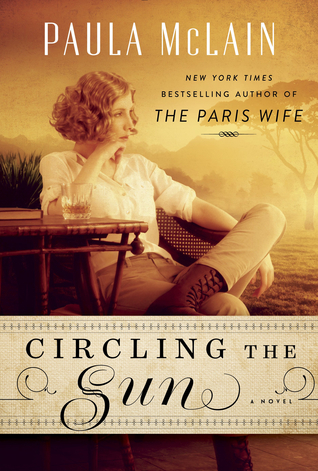
I don’t give a lot of five-star ratings, but the writing itself is enough to warrant 5 here. This is a story that does a fantastic job of transporting you to another place and time (what many of us want out of fiction, especially historical fiction).
McLain’s descriptions are vivid and emotional, yet she does not get carried away with prose as some writers tend to do. The pace was about right for chronicling a huge portion of Beryl Markham’s early life (Beryl certainly had an entire life before age 34!). McLain does a wonderful job with characterization of “real” people; interesting, round characters as flawed as you and I. If I had a quibble at all, it was toward the end. The book seemed to drag a bit in the last five or six chapters. But don’t let that stop you. A superb read! (less)
March 28, 2020
Four years and counting – my self-publishing adventure (part 2)
Note: If you missed part 1, it is here.
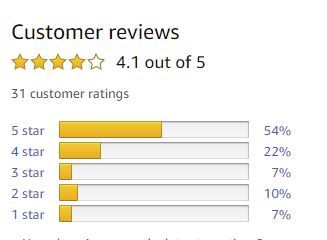 The Redemption Ratings
The Redemption RatingsNearly a thousand books sold and 31 reviews on my first book (out of four). By my calculations, it takes roughly 32 books sold for me to garner a single Amazon review. In comparison, I glanced at Dan Brown’s 2017 novel Origin. If it sold a million copies on Amazon, then it took him 38 books to garner a single review. The initial printing was 2 million, so this is probably a good seat-of-the-pants guess. Doing this exercise for other bestsellers puts my figure above in the ballpark of the best-selling authors. Now I just have to figure out how to sell a million copies (or even another couple of thousand).
From talking to other writers, reading online articles, and my own experience, one thing is clear: It is difficult to get reviews! I’m talking about honest reviews from people who read your book, don’t know you personally, and haven’t been given some incentive to post a review (there are all kinds of schemes out there to game the Amazon review process).
I’ll admit that some of my early reviews came from acquaintances. But about half or more of the 31 reviews for my first book came from people I don’t know.
Note: The current Amazon process to approve book reviews is an attempt to ensure unbiased reviews. If the reviewer can be identified as having a personal relationship with the author, then the review will be denied posting. How might they know this? They look at addresses of the reviewers, similar names, evidence the reviewer might have been paid, and on and on. You can be certain they will not release exactly how they do it. Best to read their Customer Review Guidelines, if you have not done so. People spend an inordinate amount of time gaming the review process, and Amazon has a tough job in this area.
The good news: Based on reviews from people I didn’t know and reviews on Goodreads, I would say my writing skill is in the 3- to 4-star level. Not bad for an honest rating and a self-published writer with no track record, doing it all on his own.
Goodreads, you say…
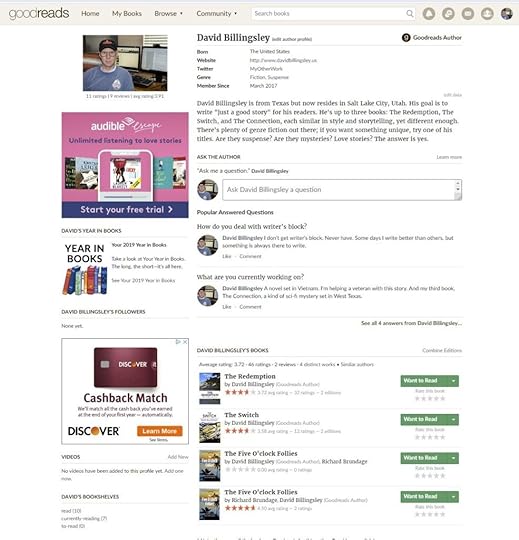
If you don’t know about Goodreads (owned by Amazon), you should. Why? It is known to be the place where real readers go. And Goodreads has approximately 90 million registered members as of July 2019 according to Statista.
My experience is that Goodreads’ reviewers are more critical, more savvy about literature, and in general, they read more books than the average Amazon reviewer. That said, expect to get a bit lower ratings on Goodreads than Amazon, and yes, Goodreads’ ratings tend to only be star ratings w/o corresponding reviews. For instance, for my four books, my Goodread’s rating is 3.71 out of 5 stars while my Amazon rating is around 4.3 out of 5 stars. Bottom line: It’s a good place to get a better idea of how your writing rates among people who spend a lot of time reading (though in most cases you won’t know why they rated your book the way they did).
So…spend some time encouraging people to leave Amazon reviews, but realize they are very tough to get. Also, sign up for an author page on Goodreads and put some effort into it. I have an author page on Amazon, but not as sold on spending time there.
What about those pesky bad reviews?
 One of my fans!
One of my fans! 
October 31, 2019
Four years and counting – a report on my self-publishing adventure (part 1)
 This is just a sprinkling of books I’ve read to help improve my writing.
This is just a sprinkling of books I’ve read to help improve my writing.It’s been four years since I first published The Redemption. I thought I might sell a few copies. It’s up to around a thousand. The Switch, which I thought was actually a better book, sold in the low hundreds. Great, you say!
So I pressed on and wrote Five O’clock Follies with Dick Brundage. A lot of fun and I learned so much about the Vietnam war. And now, I’ve gone back and finished my first (unpublished) book, The Connection. The latter is out with my larger group of beta readers, another first for me.
The point of this post (and parts 2 and 3) is to pass along my experience to other self-published writers or anyone thinking about going down this path. I hope it helps.
The Finished Product
So you’re going to write a book. It was kind of a bucket list challenge to me. To finish a first draft is a real accomplishment. I found out I have a knack for this. It’s the part of writing I enjoy tremendously. With four books under my belt, I’ve put together about 450K words. I’ve found I can gen-up a first draft in about four months (even while I’m working full-time). My only advice here: Don’t stop. Write through the first draft. Get it on “paper.” Work from there.
I wonder how many never make it this far. Everyone seems to have a book in their head, yet few finish a first draft. Since I can do it somewhat effortlessly, I believe there’s a writer in me somewhere!
So you have a first draft. Here comes the fun. Revise…revise…revise, find outside editors and beta readers, and copy edit (grammar, spelling, etc.). Then of course, there’s the book cover, the blurb, generating the ebook, and putting the word document into a printable format followed by determining where to publish, advertising, etc. I DID ALMOST ALL OF THIS MYSELF, though now I’m turning more and more to others to help.
It’s a ton of work! I have some advantages. I have a lot of technical skills, and my other hobby is photography. So I do have a bit of head-start on some people.
First thing after the draft is done, I let it sit for a few weeks. Then I start the revision process, It takes me 4 months for a first draft, but 6 months for revisions. I revise, revise, revise until I have a nearly (90% done) completed product. Then I would hand it off to my trusty beta readers, my spouse and my daughter, both ridiculously avid readers. (For my latest book, I’ve expanded to a much larger set of beta readers.) At this point, what I really want from beta readers is whether the book makes sense and is it something they enjoy reading. That’s partly why it needs to be nearly complete. In the traditional publishing environment, I would have an agent and a paid editor (and a publishing house). I couldn’t see plucking down as much as I might make on a book for an editor. Editors would argue that their service would increase the readability and value of the book enough to justify it. That may be true. I wasn’t willing to do that on my first few books.
After clearing it through my personal editors and beta readers, I returned to revision. Painstaking revision. Then the copy-editing. I did this part myself. Spent a GREAT deal of time re-learning and learning grammar-related info. Strunk and White, WD Grammar Desk Reference, Chicago Manual of Style are some of my go-to books. I’m sure there are a few grammatical mistakes in my books, but my readers have only pointed out one error so far.
Finally, after about a year, I’d have a finished manuscript.
The Cover
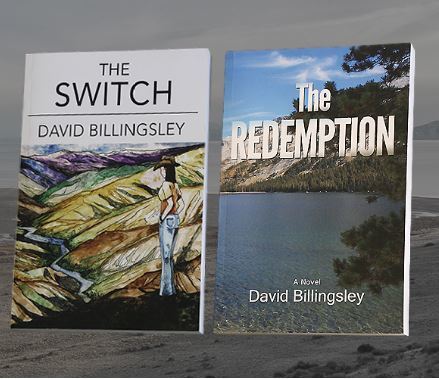 Two different ideas.
Two different ideas.The experts will tell you the cover is a big part of whether someone will buy your book. They will say it needs to give some indication of what the story is about. The latter statement is debatable. Go to a bookstore (yes, they still exist) or look on Amazon. Covers might give you a sense of the book (is it dark, lighthearted, emotional?), but it won’t tell you what the book is about. I think the cover simply needs to grab your attention.
For my first novel, The Redemption, I used the Cover Creator from Createspace (which has been absorbed into Amazon’s KDP platform). I selected the picture (my photo) on the right cover above. The original cover (not shown) was kind of amateurish but that’s what I had. Back then, all I wanted was to publish a book. One book. I didn’t really care much about a cover. It would only sell a few copies anyway. 
July 7, 2019
It’s Five O’clock Somewhere
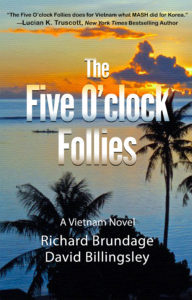 It’s done!
It’s done!Well, it’s finished! I stopped work on The Connection, my first book still unpublished, to co-author a novel called The Five O’clock Follies with Richard Brundage.
The ideas behind this book have been in Dick’s head for 50 years! So after much research and late night emails between the two of us (plus one meeting where I recorded Dick’s experiences in his own words), the different events and ideas congealed into a work of fiction we are both proud of.
The easiest way to describe the book is to think of MASH in Vietnam but in a media press center run by the U.S. Army.
I consider our venture a success before it sold a single copy. Why? We got Dick’s ideas down on paper.
It was a great challenge for me – writing a book with another person. It was easier and harder than I thought. In the end, we came out with a great product, and Dick can finally rest (Ha, if you know him, he doesn’t rest a lot).
Give it a read. Give us a review. Laugh, cry, or whatever. It’s a good story.
December 2, 2018
Free Book Promotion – Was It Worth It?
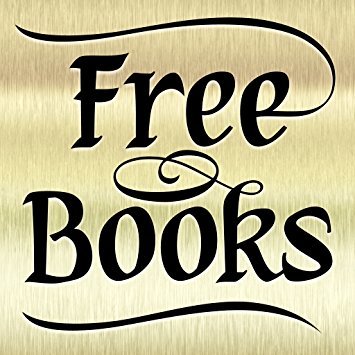 This is a followup to my previous post you can read here.
This is a followup to my previous post you can read here.
I gave away about 700 copies of The Redemption a few months ago as an experiment. Never been too fond of the idea, but thought that if I could get it into a few hundred sets of hands, maybe that would spread the word about the book. Publicity?!
Results at the two month’s marker: Two more Goodreads reviews and only one new Amazon review.
Preliminary conclusions: It could certainly be that many who downloaded the book simply haven’t read it yet. I can deduce from KindleUnlimited page read metrics that most of my readers who start the book do finish it. And so far, the 42 reviews I have received (Amazon and Goodreads) have been favorable.
It may be true that many “readers” simply download anything free that comes along and may or may not read it in the future. Given how hard it is to get someone to review anyone’s book, there will be much that I will never know.
The verdict: Don’t do free. I won’t do it again unless I receive at least a dozen or so new reviews in the upcoming months. My books are now priced back at 2.99 and are well worth every penny. Now if I can just get everyone else to feel that way… 
October 7, 2018
Free book promotion – is it worth it?
My personal bestseller, The Redemption, has been out for a couple of years. Through a myriad of advertising (Amazon ads, Facebook boosts on my author page, Twitter posts, and FB posts on my personal page, I’d cracked just under 500 sales and 22 Amazon reviews (17 on Goodreads). Tons of effort but still not bad.
So I figured what the heck, I’ll try a free Kindle download promotion. Decided to limit it to a three day period over a weekend. (It’s no longer free…just showing one of the ads.)

Pushed out a few FB posts and tweets about the upcoming free period. Nothing too exotic. I didn’t use any of the free-book-distribution help sites ubiquitous on the Web.
First day, a Friday, gave away a whopping TWO copies. Can’t tell you how bummed I was. But Saturday, I tallied just under 600! copies. Sunday fell off to just under a hundred more. So roughly 700 more people had my first book in hand (on Kindle), a couple of hundred more than all I sold.
I was pretty pumped about it, but the benefit is yet to be derived. I wonder:
How many people will read it?
How many will leave a review?
Are these readers different than my core readership?
How many just download anything free and rarely read any of it?
What will be a success in my mind? I’m not looking for much. Maybe ten more reviews at some point. A few readers who buy my newer books (not sure how I will know). Maybe a few more FB fans.
So I’ll wait and see. Will let you know in a few months if it was worth it…
September 24, 2018
Free for Three
 Free.
Free.(Get The Redemption for free on Kindle download, 9/28-9/30 here. Won’t show free till this weekend.)
It’s something I said I’d not do. Yet when you have only attracted a few hundred readers in a couple of years and only a handful of reviews, you have to decide to: (1) Stop writing – my stuff is not that good, (2) go with the status quo, or (3) try something radical.
#1 could be true but you can’t let yourself believe it. Doubt is such an insidious evil to writers, it is hard to even explain it to those who have not penned a 300 page novel. Trust me, even famous writers who draft million sellers feel like they are writing garbage sometimes. My writing can certainly improve, but the stories are there and fairly well told (IMO).
So on to #2. One of my previous blog posts dealt with what I am up against–competition for eyeballs as some would say. And I’m competing with not only millions of other authors, but with the idiot device too (your cell phone which you might be staring at right now) as well as poorly written and executed TV series that people binge watch (yes, there are a few gems). My book is one of approximately SIX million on Amazon (ebooks only estimate) – a staggering amount of competition. So make yourself better known, you say. Advertising is almost uglier than selling books. New media such as Facebook (and soon with Twitter) have made it virtually impossible to use your business page to attract new readers. If you don’t spend money “to boost your posts,” FB will only share your post with very few of your followers. If you do boost your post, you spend too much $$ for too little return. Amazon ads are a bit more effective, but still cost me more than I make per new reader. On Twitter, it’s not only Twitter’s late start in figuring out how to monetize it through advertising, the audience is an issue too. Mostly I’m connecting with a bunch of authors just like me, not my target audience. Snapchat and Instagram are a waste of time (for ads, okay maybe a waste of time for anything). Lastly the online world is full of “services” that will help you attract eyeballs or help you produce your self-published book. Most of these services are probably worthless, likely people trying to make a few bucks on all of us authors with little to offer.
That leaves #3. A radical idea. Giving my book away for free to hopefully gain some new readers. Some have done it with mixed success. So why don’t I like it? People tend to value most things by how much they cost. The 99 cent Toni home perm comes to mind. I can never find a reference for this, but when I was in business school, the marketing types would bring up the 99 cent home perm (that debuted back in the 40s or 50s). Apparently, Toni priced the initial home perm for 99 cents and no one bought it. How good could a home perm for 99 cents be? Raised the price to 2.99 and it sold like hotcakes. Same product. My fear is that people will value a free book as something no one would want to read in the first place. If they pay a few bucks, they are at least invested.
So here goes nothing. Friday at midnight (Sept 28th, 00:00 PDT, hey it’s Amazon’s timezone), The Redemption will be a free Kindle download. But only for 3 days (Friday, Saturday, and Sunday)…
We’ll see if anything comes of it. I have my doubts. In a month, I’ll let you know how it went. Happy Birthday to me 
February 18, 2018
What I’m Up Against

What are my expectations? As a fledgling writer, this question is much more difficult to answer than one might think. Rationally, the odds of “breaking out” as a self-published author are pretty bad (more on that). But what about success? Really depends on my definition.
For Vegas, the odds of winning at the chairs in the picture are fairly clear, especially the longer you sit and bet. The payout of most slots is in the 90+% range in Vegas, let’s say 92%. So for every dollar you spend, you are apt to lose 8 cents (on average). It’s a pretty bad investment (tell someone you invested in a wildly volatile stock that averages a loss of 8% and see what they say). However, a few lucky souls will win big at the expense of all the rest of us losing our 8 cents a spin. Play a really long time and you will lose. Yet again, it’s kind of fun to try and be that one who wins big.
So back to writing. Here’s what I’m up against:
According to the NEA, in 2015, only ~43% of American adults read any work of literature in a year (includes novels, short stories, poems, or plays either printed or online), down from 57% in 1982,
~95% of American adults own a cell phone (77% a smartphone) (Pew Research);
Netflix subscribers watched 140 million hours/day or a billion hours/week in 2017;
A tough number to come by, but there are roughly 10-15 million books available on Amazon (and that number could be conservative);
There are roughly 5-6 million ebooks (by various estimates) on Amazon;
Average indie ebook sells 250 copies in its lifetime (and I think this stat is now too high!);
There may even be a trend from ebooks back to print (debatable).
I could go on. For example, what are the odds of making a living as a novelist? Chance of picking up a contract from a good publishing house? Neither are very good. I hesitate to even put numbers out there, but you are probably better off on the slot machine.
The issues above in my partial challenge list seem daunting. Fewer people read (to be included in the 43% number, you only have to read one literary thing a YEAR). A great many people spend a great deal of time staring at small-screens (i.e., smartphones/tablets) or large screens (e.g., Netflix bingeing), and almost all of that time is NOT spent reading fiction. While people are not reading, the number of books available to read is growing at a ridiculous rate. And on and on…
It’s depressing…
So why do I press on in such an environment?
For starters, my first book was written as a challenge to myself. Could I write a novel from start to finish? Or even more important, could I tell a story? Most people say they will write a novel. I did. Success #1, IMO.
After that, consider this:
The Redemption sold a little more than the average ebook, and its not done selling yet. (I expected to sell only a few copies.)
The Switch is a better book IMO and is doing about as well as The Redemption did at this point.
Early on, The Redemption was selling in the top 7% of all Amazon ebooks. (Sounds great, but a huge number of those 5-6M titles are not selling at all in any specific time frame). Right now, The Redemption is only selling a few copies a month, but that’s enough to surpass 95% of Amazon ebooks (at the moment and according the the Amazon ranking algorithms).
That above is success #2…
And there is more “good news” to come. I have one more book nearly finished, and it is pretty good (IMO). Then I’m off on an adventure with someone most of my friends know. He wants help writing the book he always wanted to write – and he has great material. After that, another book-in-my-brain that wants to be written will probably be written. Potential success #3.
So if you read my stuff, stay with me… more to come…
January 15, 2018
The Journey – Sequel
Why write fiction? There are so many quotes about the “misery” of being a writer. My favorite is my own which goes something like this:
Writing a first novel is a great achievement. Writing a second novel is insanity.
The insanity is that you (I) suffered through the first one and then did it again. Reminds me of a woman who has a baby and then wants to go through all of that again a few years later. To give you a sense of the misery of writing The Redemption, here’s a few highlights:
In 2001, I stood by a radio station in West Texas and pondered a story about a stranger walking down the lonely highway.
A year later (or so, my memory ain’t so good), I started on The Connection. My goal was to write a full-blown novel. I had no experience, no training, and no idea how to do that.
In 2007, I finished the novel. My daughter had a single copy printed, and I thought I’d write that off my bucket list. My readers were mainly my parents, my mother-in-law (who was my very first reader), and my wife.
Meanwhile, the idea for another novel (The Redemption) would not go away. The question: What would happen if a mother found out 33 years later that her husband switched their daughter with another at birth? She would find this out from a letter her husband wrote her on his deathbed and the other parents were uber-rich.
I put together outlines, character descriptions, other background, and chapter one in 2007/2008. I spent 2008-2011 writing various versions of the book, educating myself about the writing process (plot, scene structure, description, conflict, setting, character, viewpoint, etc.), but also stopping for months at a time.
In 2012-2015, I put the published version together. The very first draft looked nothing like the end result. I had a few family members read it, but mostly I was the writer, editor, book cover designer, etc. I spent another six months understanding grammar, so the book could be as professional as I could make it.
In the fall of 2015, I self-published it after editing eleven “final draft” versions (I can’t count how many versions I played around with before that). I was proud of my final product.
Even with all of that preparation and work, I didn’t expect many people to read it. There were so many things going against me which can be summarized in these three statements:
People don’t seem to read anymore,
People have so much competition for their eyeballs and dwindling free-time, and
Everybody seems to be writing books and self-publishing
By winter, I had sold 50 copies which was about 40 more than I thought I would sell. Then a weird thing happened in the late spring (for which I still don’t understand). My book spiked a bit and sold another 150 copies. As of today I’m closing in on 400 copies. That’s not exactly a million seller, but it surprised me.
To date, the book has received 21 reviews and that’s with cajoling several people to leave a review. Most of the feedback has been positive (through these reviews and personal feedback). A few people didn’t care for it and that’s to be expected.
With one published book in my pocket, I spent the last two years finishing The Switch. I think its a better book from a “page-turner” aspect. Even had a local artist volunteer to do the cover, which looks great and gives the book some uniqueness from that standpoint. The entire process was also much easier after writing one book.
Bottom line: It took me fifteen years to publish my first novel (though I didn’t really work on it the whole time). Now I have a second book out, sales are slow, interest seems lukewarm, but I’m still ahead of my pace with The Redemption. It’s during THIS time that writing has some “misery” to me. Writing the book now is more natural; marketing it is really, really tough. Will I sell 100, 200, 300, 400, or more? If I don’t top The Redemption’s success, should I continue? I already have The Connection (my first book that went unpublished) nearly rewritten, another book in my head, and a request from a friend to co-write a GREAT story with him.
Many successful self-published writers say you need to write 5-10 books before you build a following.
Time will tell…



